Find Help
More Items From Ergsy search
-
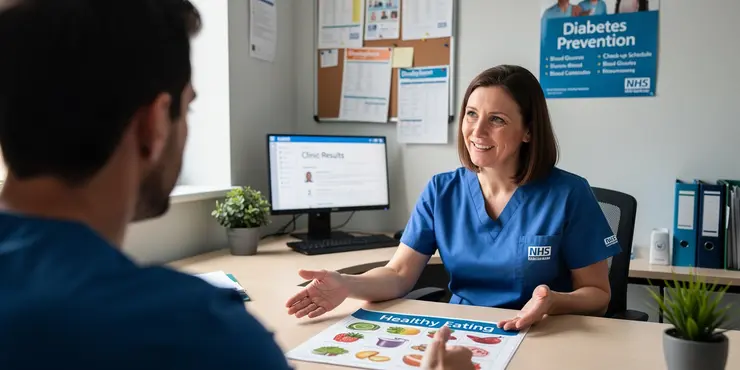
Can Type 2 Diabetes be prevented?
Relevance: 100%
-
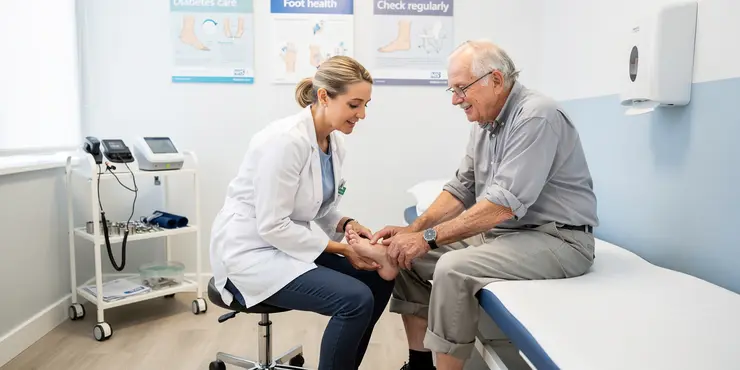
Diabetes Care - Preventing Amputations
Relevance: 97%
-
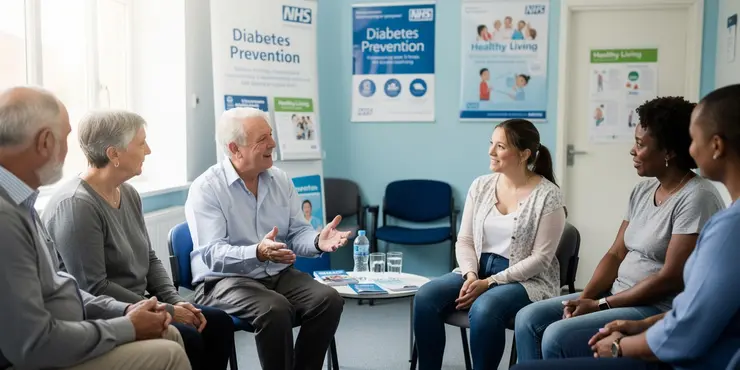
NHS Diabetes Prevention Programme; Preventing Type 2 and improving outcomes for people with diabetes
Relevance: 96%
-

The NHS Diabetes Prevention Programme story
Relevance: 95%
-
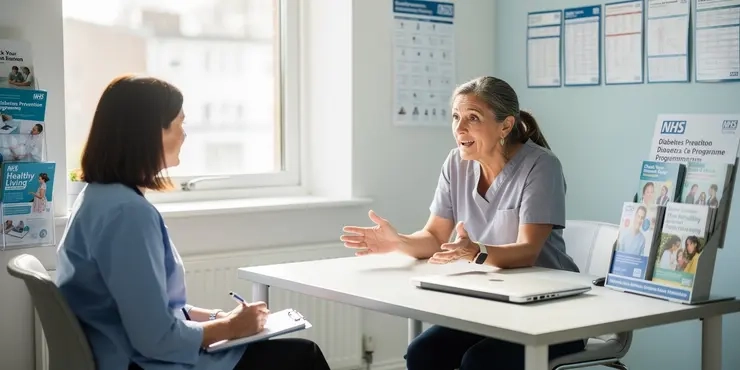
Hansa's story - The NHS Diabetes Prevention Programme
Relevance: 92%
-
Are there any clinical trials for preventing type 1 diabetes?
Relevance: 91%
-

Tom's story (NHS Diabetes Prevention Programme)
Relevance: 91%
-

Can exercise help prevent gestational diabetes?
Relevance: 90%
-

Pam’s story - The NHS Diabetes Prevention Programme
Relevance: 90%
-

Tom's story (NHS Diabetes Prevention Programme)
Relevance: 89%
-
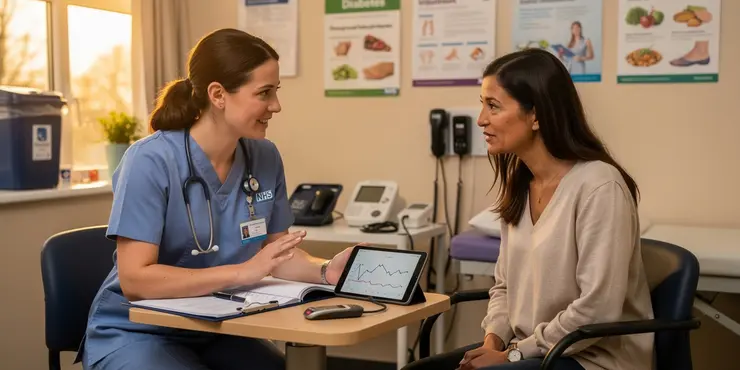
What Is Type 2 Diabetes? | 2 Minute Guide | Diabetes UK
Relevance: 74%
-

Is Type 2 Diabetes hereditary?
Relevance: 72%
-
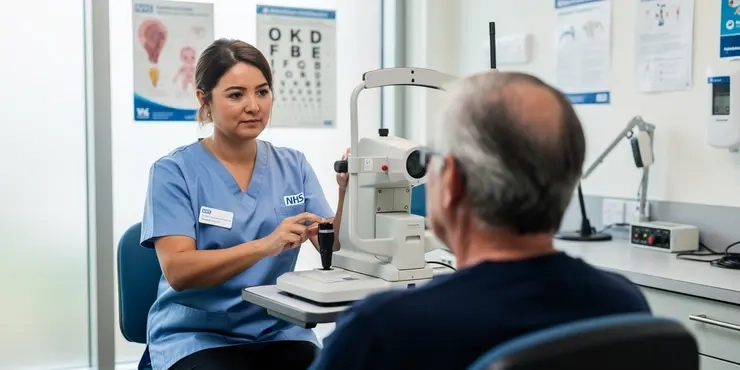
Derbyshire Diabetic Eye Screening - Diabetic Eye Screening
Relevance: 72%
-
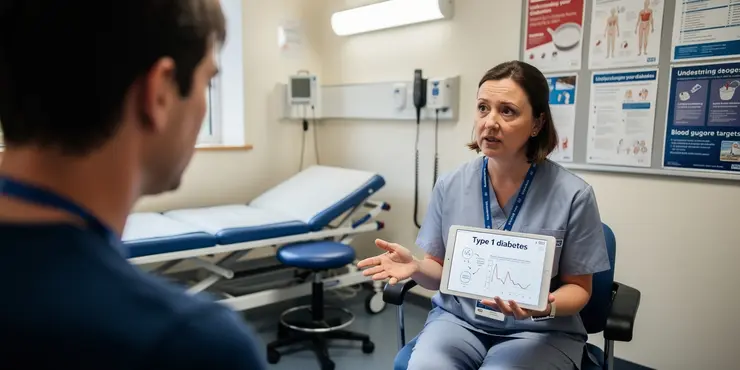
What is type 1 diabetes?
Relevance: 71%
-
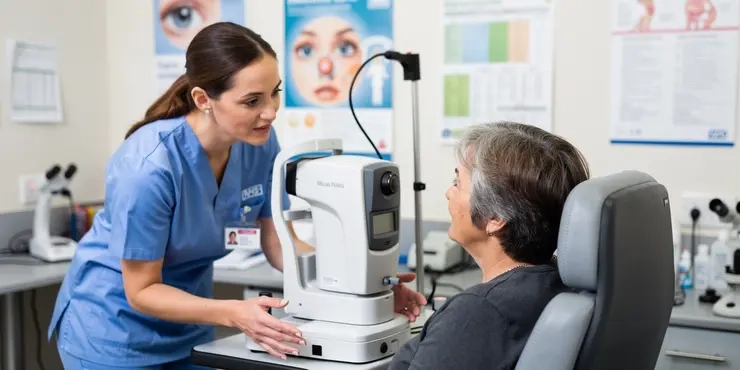
Diabetes Eye Screening
Relevance: 71%
-
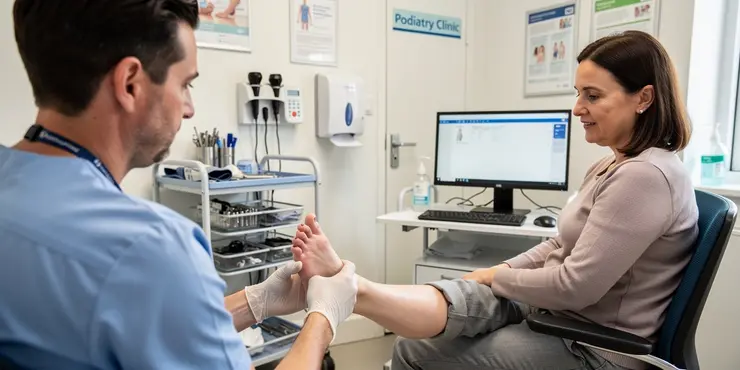
Diabetic Foot Conditions Podiatrist
Relevance: 70%
-
Is there a genetic predisposition to type 1 diabetes?
Relevance: 70%
-
What is type 1 diabetes?
Relevance: 69%
-
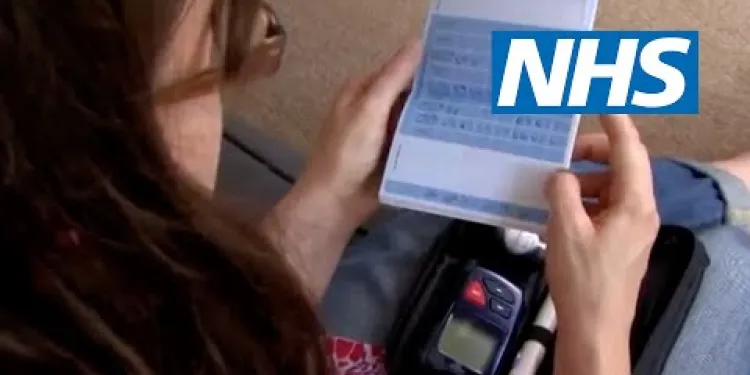
Gestational diabetes | NHS
Relevance: 68%
-

Improving outcomes for people with diabetes
Relevance: 67%
-

Type 1 Diabetes supporting adults to manage Type 1 diabetes
Relevance: 66%
-
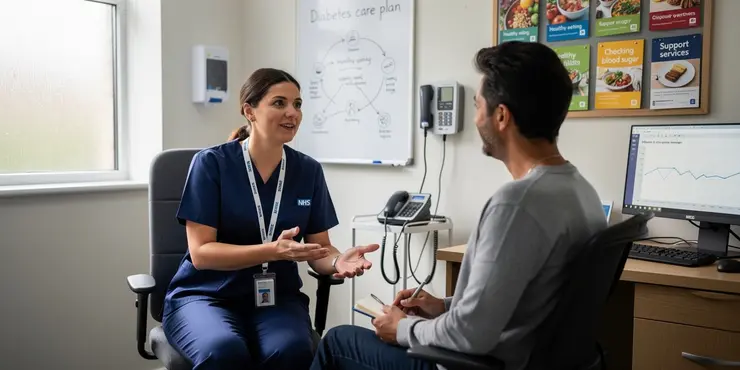
What complications are associated with Type 2 Diabetes?
Relevance: 66%
-
What are the limitations of type 1 diabetes screening?
Relevance: 65%
-

What causes Type 2 Diabetes?
Relevance: 65%
-
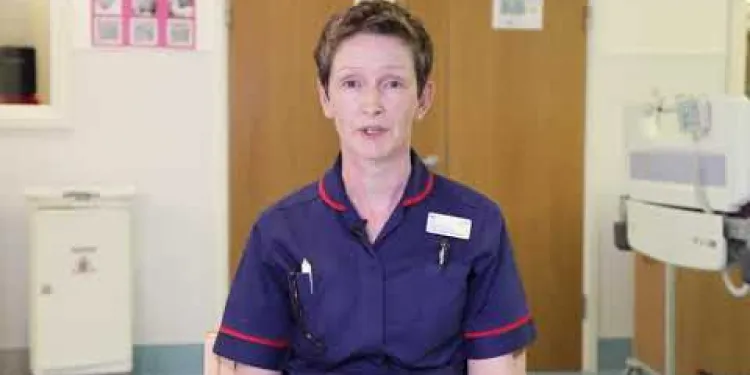
Gestational Diabetes during pregnancy
Relevance: 65%
-
What is the difference between type 1 and type 2 diabetes?
Relevance: 65%
-

How is Type 2 Diabetes diagnosed?
Relevance: 64%
-
What are the benefits of early detection of type 1 diabetes?
Relevance: 64%
-
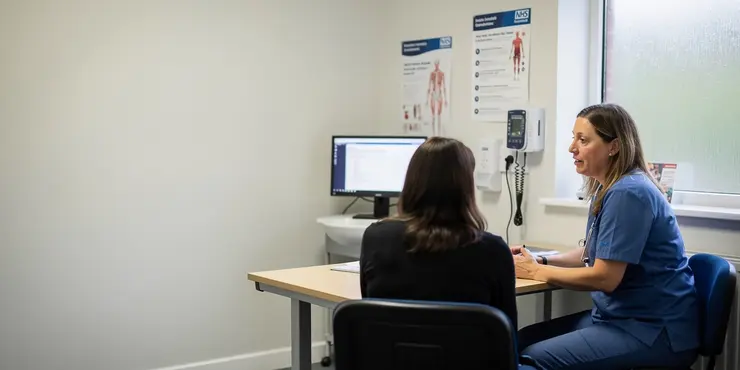
Is Teplizumab used to treat diabetes?
Relevance: 64%
-
What does screening for type 1 diabetes involve?
Relevance: 64%
-
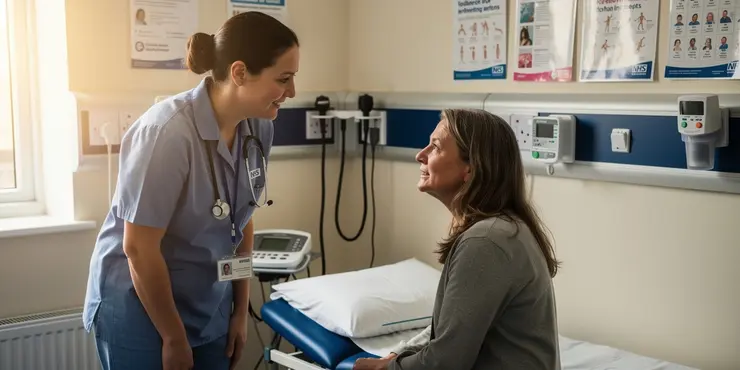
What are the symptoms of Type 2 Diabetes?
Relevance: 63%
-
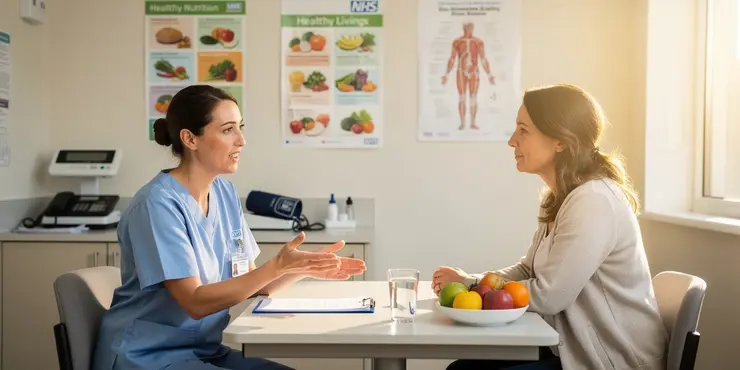
How to manage type 2 diabetes
Relevance: 63%
-
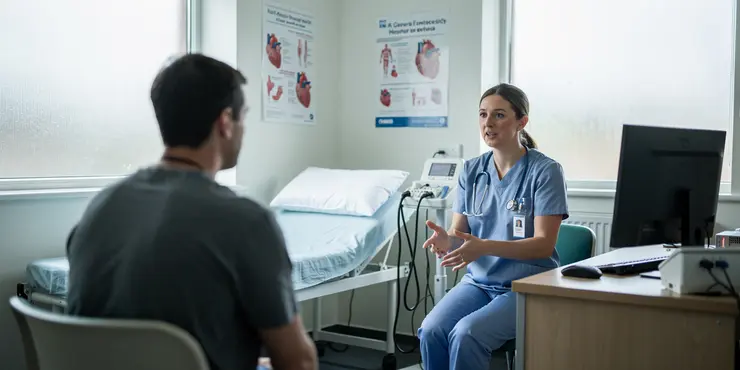
Are heart attack symptoms different for people with diabetes?
Relevance: 63%
-

How is Type 2 Diabetes treated?
Relevance: 62%
-
Can environmental factors contribute to type 1 diabetes?
Relevance: 62%
-
What is Barbie Doll Diabetes?
Relevance: 62%
-
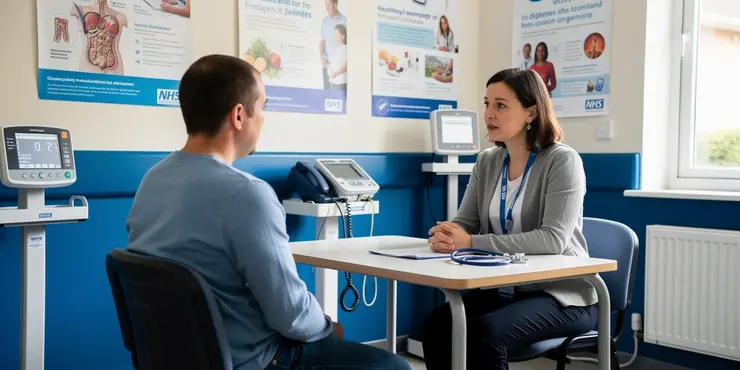
Is Ozempic suitable for type 1 diabetes?
Relevance: 62%
-
Does insurance cover type 1 diabetes screening?
Relevance: 62%
-
Can I have sugar if I am diabetic?
Relevance: 61%
-
Should siblings of a child with type 1 diabetes also be screened?
Relevance: 61%
Tom's Journey with the NHS Diabetes Prevention Programme
Introduction to the Programme
The NHS Diabetes Prevention Programme (NHS DPP) is a pivotal initiative aimed at reducing the incidence of Type 2 diabetes across the United Kingdom. By identifying individuals at high risk and providing them with support to make sustainable lifestyle changes, the NHS DPP aims to alter the course of diabetes and improve the overall health outcomes. Tom is one such individual who greatly benefited from this valuable programme.
Tom's Initial Struggles
Before joining the NHS DPP, Tom was struggling with his weight and reported feeling increasingly fatigued. His lifestyle choices, including a sedentary job and a diet high in processed foods, put him at significant risk of developing Type 2 diabetes. Concerned about his health and encouraged by his GP, Tom decided to take proactive steps to manage his risk.
Starting the Programme
After receiving a referral to the NHS DPP, Tom was assessed and confirmed as being at high risk of developing Type 2 diabetes. He enrolled in the programme where he had access to professional nutrition advice, tailored exercise routines, and regular support from trained health coaches. This structured approach offered him a comprehensive pathway to change.
Adopting a Healthier Lifestyle
The next phase of Tom's journey involved altering his daily habits. With guidance from the programme, Tom learned to make healthier dietary choices, opting for more vegetables, whole grains, and lean proteins. Additionally, he introduced regular physical activity into his routine, starting with manageable goals such as walking and gradually progressing to more intensive exercises.
Tracking Progress and Achievements
Throughout the NHS DPP, Tom received continuous support and had regular check-ins to monitor his progress. These sessions were crucial for staying motivated and making adjustments as needed. Over time, Tom saw significant improvements in his weight, energy levels, and overall well-being. Just as importantly, his blood sugar levels also showed positive changes, reducing his risk of developing Type 2 diabetes.
Long-Term Benefits
By the end of the programme, Tom had not only achieved his initial health goals but had also cultivated a sustainable and healthy lifestyle. The skills and knowledge he gained from the NHS DPP became integral parts of his day-to-day life. As a result, Tom not only averted the immediate risk of diabetes but also laid a foundation for continued health and well-being in the long term.
Conclusion
Tom's story is a testament to the efficacy of the NHS Diabetes Prevention Programme. By offering targeted support and fostering healthier lifestyle changes, the NHS DPP plays a crucial role in the fight against Type 2 diabetes in the United Kingdom. For individuals like Tom, the programme provides an opportunity to take control of their health and create lasting positive change.
Tom's Journey with the NHS Diabetes Prevention Programme
Introduction to the Programme
The NHS Diabetes Prevention Programme helps stop Type 2 diabetes in the UK. It helps people who might get diabetes by showing them how to live healthier. Tom is one person who got a lot of help from this programme.
Tom's Initial Struggles
Before Tom joined the programme, he had trouble with his weight and felt very tired. He sat a lot at work and ate a lot of junk food. This made it easier for him to get Type 2 diabetes. Tom wanted to feel better, and his doctor said the programme could help.
Starting the Programme
Tom went to the programme and they checked his health. They said he might get diabetes. So, he joined. He learned about eating healthy foods, had special exercises to do, and a coach who helped him. The programme gave him a good plan to get healthier.
Adopting a Healthier Lifestyle
The next part of Tom's journey was changing what he did every day. With help from the programme, Tom started eating more vegetables, grains, and proteins. He also began to exercise a bit every day, like walking. Then he did harder exercises little by little.
Tracking Progress and Achievements
In the programme, Tom got help all the time and talked to coaches often. This helped him stay excited and change things if needed. Tom lost weight, felt more energy, and his health got better. His blood sugar went down, which meant he was less likely to get diabetes.
Long-Term Benefits
When Tom finished the programme, he reached his health goals. He learned to live in a healthy way every day. Tom stopped worrying about diabetes and found a way to stay healthy for a long time.
Conclusion
Tom's story shows the programme works well. The NHS Diabetes Prevention Programme helps people change their lives to fight Type 2 diabetes in the UK. For people like Tom, it is a chance to take charge of their health and make lasting, good changes.
Frequently Asked Questions
What was Tom's initial motivation to join the NHS Diabetes Prevention Programme?
Tom joined the NHS Diabetes Prevention Programme because he was concerned about his increasing weight and the potential health risks, especially Type 2 diabetes, that come with it.
How did Tom find out about the NHS Diabetes Prevention Programme?
Tom found out about the NHS Diabetes Prevention Programme through his GP, who recommended the programme after a routine health check-up indicated that he was at high risk of developing Type 2 diabetes.
What were Tom's initial health concerns?
Tom was worried about his weight gain and the associated risks of developing Type 2 diabetes, which was highlighted during a health check-up at his GP's office.
What kind of support did Tom receive from the NHS Diabetes Prevention Programme?
Tom received guidance on healthy eating, physical activity, and lifestyle changes from NHS coaches and health professionals, who provided him with the knowledge and tools to reduce his risk of Type 2 diabetes.
What changes did Tom make to his diet?
Tom made significant changes to his diet, including reducing his intake of sugar and processed foods, and increasing his consumption of vegetables, fruits, and whole grains.
How did physical activity play a role in Tom's lifestyle change?
Physical activity became a crucial part of Tom's lifestyle change. He started incorporating regular exercise into his routine, which helped him lose weight and improve his overall health.
What progress did Tom make in terms of weight loss?
Tom successfully lost a significant amount of weight, which was a major goal for him in reducing his risk of developing Type 2 diabetes.
How did Tom feel about the support he received from the programme?
Tom felt very positive about the support he received. He appreciated the practical advice, encouragement, and the structured approach that helped him stay motivated and on track.
What impact did the programme have on Tom's risk of developing Type 2 diabetes?
The programme had a significant positive impact on Tom's risk of developing Type 2 diabetes. Through the lifestyle changes he made, he considerably reduced his risk.
Would Tom recommend the NHS Diabetes Prevention Programme to others?
Yes, Tom would definitely recommend the NHS Diabetes Prevention Programme to others who are at risk of Type 2 diabetes. He believes it has been life-changing for his health.
How did Tom stay motivated throughout the programme?
Tom stayed motivated by setting realistic goals, tracking his progress, and relying on the support and encouragement from NHS coaches and other programme participants.
Did Tom experience any challenges during the programme?
Yes, Tom faced challenges such as sticking to a healthier diet and maintaining a regular exercise routine, but he overcame them with the help of the structured support from the programme.
What advice does Tom have for others considering the programme?
Tom advises others to be open to the lifestyle changes recommended by the programme and to take full advantage of the support and resources provided by NHS professionals.
Did Tom notice any other health benefits from losing weight and changing his lifestyle?
Yes, besides reducing his risk of diabetes, Tom noticed improvements in his overall energy levels, physical fitness, and mental well-being.
How has Tom's experience with the programme changed his perspective on health?
Tom's experience with the programme has given him a greater appreciation for the importance of preventive health measures and has motivated him to maintain a healthier lifestyle moving forward.
Why did Tom want to join the NHS Diabetes Prevention Programme at first?
Tom joined a special program. This program helps people stop getting a sickness called Type 2 diabetes. He joined because he was worried about gaining too much weight. Being too heavy can make people sick, like getting diabetes.
How did Tom learn about the NHS Diabetes Prevention Programme?
How did Tom know about the NHS Diabetes Prevention Programme?
Suggestion: Use simple words and short sentences.
Tip: You can use tools like pictures or audio to help understand better.
Tom learned about the NHS Diabetes Prevention Programme after he went to see his doctor. The doctor suggested the programme because a health check showed Tom might get Type 2 diabetes.
What were Tom's early health worries?
Tom was worried because he was getting heavier. At the doctor’s office, they told him this could make him get sick with something called Type 2 diabetes.
How did the NHS Diabetes Prevention Programme help Tom?
Tom got help from NHS coaches and health experts. They taught him how to eat healthy, exercise, and change his daily habits. This advice helped Tom lower his chance of getting Type 2 diabetes.
What food did Tom change to eat?
Tom changed what he eats. He now eats less sugar and junk food. He eats more vegetables, fruits, and whole grains.
How did exercise help Tom live healthier?
Exercise helped Tom change his life. It made him feel better and stronger. Exercise is good for the body and mind. It can make people happy and healthy.
If you want to exercise like Tom, try these ideas:
- Go for a walk every day.
- Play your favorite sport.
- Dance to music you love.
Using pictures or apps can make exercise more fun and easy. You can also ask a friend or family to join you!
Tom started exercising a lot. This was important for his new way of living. Exercise helped Tom lose weight and feel healthier.
How much weight did Tom lose?
Tom lost a lot of weight. This was really important to Tom because it helps him stay healthy and makes it less likely he will get a sickness called Type 2 diabetes.
How did Tom feel about the help he got from the program?
Tom was in a program. The program gave him help. How did he feel about this help?
Think about how help can make you feel. Did Tom feel happy, sad, or something else?
You can use tools like a feeling chart to help think about feelings. Talking with a friend can also help. Try to use simple words to share your thoughts.
Tom was happy with the help he got. He liked the good advice, the cheers, and the plan that kept him excited and moving forward.
How did the program help Tom with Type 2 diabetes?
This question asks if the program made Tom less likely to get Type 2 diabetes.
You can use pictures or videos to help understand what the program did for Tom.
Remember that Type 2 diabetes is when your body has trouble using sugar for energy.
The program helped Tom a lot. It made it less likely for him to get Type 2 diabetes. By changing how he lived, Tom made his chances of getting the disease much smaller.
Tools like reading guides or text-to-speech software can also help people understand better.
Does Tom think the NHS Diabetes Prevention Programme is good for others?
Yes, Tom would tell other people to try the NHS Diabetes Prevention Programme if they might get Type 2 diabetes. He says it helped him a lot and changed his life.
What helped Tom keep going in the program?
Tom stayed motivated by setting easy goals, keeping track of how he was doing, and getting help from NHS coaches and his friends in the program.
Did Tom have any problems during the program?
Yes, Tom had some hard things to do. It was tough for him to eat healthy food and exercise regularly. But Tom got through it with help from the program, which gave him a plan and support.
What does Tom say to help others think about joining the program?
Tom says it's good to listen to the new ways of living suggested by the program. He also says to use all the help and tools that NHS experts give you.
What else did Tom feel better about after losing weight and living healthier?
When Tom lost weight, he might have felt other health benefits. Here are some things he might notice:
- Tons of energy! You can play more and feel awake.
- You might sleep better at night.
- Feeling happy and good inside.
- Doing fun things like running is easier.
Support tools can help, like:
- Using a journal to write down how you feel.
- Talking to friends or family about your feelings.
- Using apps to help you stay healthy.
Yes, by making healthy changes, Tom felt better. He had more energy, got fitter, and felt happier.
How did the programme change the way Tom thinks about being healthy?
Here is how to make it easier to understand:
- Use simple words.
- Use short sentences.
- Break information into small parts.
- Visual aids like pictures or diagrams can help.
Tom learned a lot from the program. Now, he knows it is important to stay healthy and take care of himself. This has made him want to keep living in a healthy way.
Useful Links
This website offers general information and is not a substitute for professional advice.
Always seek guidance from qualified professionals.
If you have any medical concerns or need urgent help, contact a healthcare professional or emergency services immediately.
Some of this content was generated with AI assistance. We’ve done our best to keep it accurate, helpful, and human-friendly.
- Ergsy carfully checks the information in the videos we provide here.
- Videos shown by Youtube after a video has completed, have NOT been reviewed by ERGSY.
- To view, click the arrow in centre of video.
- Most of the videos you find here will have subtitles and/or closed captions available.
- You may need to turn these on, and choose your preferred language.
- Go to the video you'd like to watch.
- If closed captions (CC) are available, settings will be visible on the bottom right of the video player.
- To turn on Captions, click settings .
- To turn off Captions, click settings again.
More Items From Ergsy search
-

Can Type 2 Diabetes be prevented?
Relevance: 100%
-

Diabetes Care - Preventing Amputations
Relevance: 97%
-

NHS Diabetes Prevention Programme; Preventing Type 2 and improving outcomes for people with diabetes
Relevance: 96%
-

The NHS Diabetes Prevention Programme story
Relevance: 95%
-

Hansa's story - The NHS Diabetes Prevention Programme
Relevance: 92%
-
Are there any clinical trials for preventing type 1 diabetes?
Relevance: 91%
-

Tom's story (NHS Diabetes Prevention Programme)
Relevance: 91%
-

Can exercise help prevent gestational diabetes?
Relevance: 90%
-

Pam’s story - The NHS Diabetes Prevention Programme
Relevance: 90%
-

Tom's story (NHS Diabetes Prevention Programme)
Relevance: 89%
-

What Is Type 2 Diabetes? | 2 Minute Guide | Diabetes UK
Relevance: 74%
-

Is Type 2 Diabetes hereditary?
Relevance: 72%
-

Derbyshire Diabetic Eye Screening - Diabetic Eye Screening
Relevance: 72%
-

What is type 1 diabetes?
Relevance: 71%
-

Diabetes Eye Screening
Relevance: 71%
-

Diabetic Foot Conditions Podiatrist
Relevance: 70%
-
Is there a genetic predisposition to type 1 diabetes?
Relevance: 70%
-
What is type 1 diabetes?
Relevance: 69%
-

Gestational diabetes | NHS
Relevance: 68%
-

Improving outcomes for people with diabetes
Relevance: 67%
-

Type 1 Diabetes supporting adults to manage Type 1 diabetes
Relevance: 66%
-

What complications are associated with Type 2 Diabetes?
Relevance: 66%
-
What are the limitations of type 1 diabetes screening?
Relevance: 65%
-

What causes Type 2 Diabetes?
Relevance: 65%
-

Gestational Diabetes during pregnancy
Relevance: 65%
-
What is the difference between type 1 and type 2 diabetes?
Relevance: 65%
-

How is Type 2 Diabetes diagnosed?
Relevance: 64%
-
What are the benefits of early detection of type 1 diabetes?
Relevance: 64%
-

Is Teplizumab used to treat diabetes?
Relevance: 64%
-
What does screening for type 1 diabetes involve?
Relevance: 64%
-

What are the symptoms of Type 2 Diabetes?
Relevance: 63%
-

How to manage type 2 diabetes
Relevance: 63%
-

Are heart attack symptoms different for people with diabetes?
Relevance: 63%
-

How is Type 2 Diabetes treated?
Relevance: 62%
-
Can environmental factors contribute to type 1 diabetes?
Relevance: 62%
-
What is Barbie Doll Diabetes?
Relevance: 62%
-

Is Ozempic suitable for type 1 diabetes?
Relevance: 62%
-
Does insurance cover type 1 diabetes screening?
Relevance: 62%
-
Can I have sugar if I am diabetic?
Relevance: 61%
-
Should siblings of a child with type 1 diabetes also be screened?
Relevance: 61%


